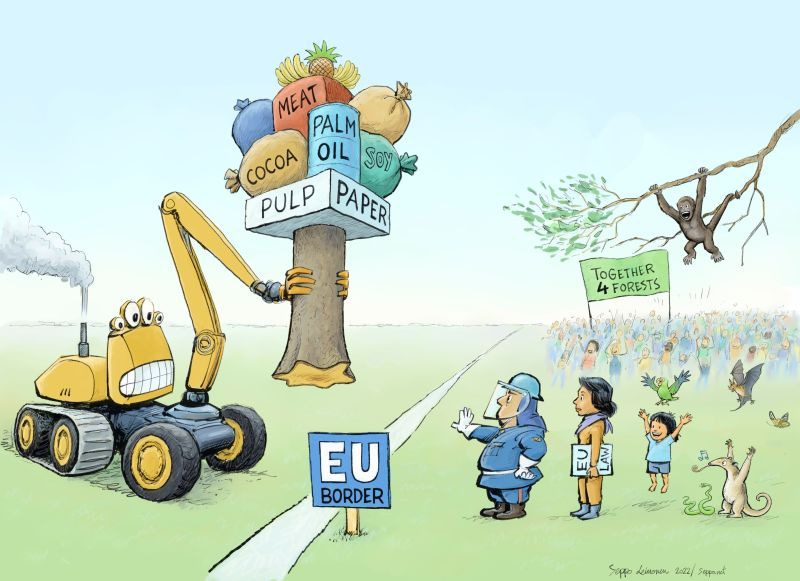
On September 13, 2022, the European Parliament (EP) voted in favor of a new EU deforestation law that will help in the fight against global climate change and biodiversity loss. The EP has demanded that companies ensure that products sold in the EU do not come from deforested or degraded land1, thereby ensuring that the products consumers buy do not contribute to the destruction of forests, including irreplaceable tropical forests.
The vote: 453 votes to 57 and 123 abstentions, a resounding and victorious result!1
Europe and Deforestation
Deforestation is the permanent destruction of forests and woodlands and the conversion to non-forest uses such as agriculture. Forest degradation is the loss of the forests’ capacity to provide their essential goods and services.2
The EU’s demand for food and foodstuff is driving large-scale global deforestation and forest degradation, often in tropical regions, a problem that is worsening year by year. The EU is responsible for 16% of the world’s forest destruction, unacceptable!2
On top of that, the summer of 2022 saw tremendous destruction by forest fires in Europe itself, making headlines week after week. We are witness to nature’s destruction due to human irresponsibility!
The EU Deforestation Law
Within this positive outcome on the EU’s deforestation law, MEPs also voted for significant improvements to it- which will help compensate for the Council’s unfortunately weak position on this deforestation law so far.1
Improvements include including “other wooded land” in addition to forests into the law, which means that the law will include other areas like savannahs. Fantastic news! MEPs also voted for a higher number of checks on products, clearer definitions for important terms such as “forest degradation” and an enlarged product scope covering other products – such as pig meat, sheep and goats, poultry, maize, rubber, charcoal and printed paper products – in addition to the already agreed beef, soy, palm oil, rubber, timber, cacao and coffee products.1 The protection of human rights, especially that of indigenous peoples, was also reinforced.
In a fantastic turn of events, MEPs kept the finance sector into the law, which had been a point of contention. This means that all companies, including those supporting huge deforesters, will now have to abide by this law!1
How will companies exercise this due diligence of not contributing to deforestation? A range of tools are at their disposal such as satellite monitoring tools, field audits, capacity building of suppliers or isotope testing to check where products come from. New EU authority procedures, classification and transparent assessments, and publicly available anonymous data are also on the cards.
The next step is for The European Commission, Council and Parliament to negotiate a consensual text, which, given the that the EP has already adopted a more ambitious text in its vote, means that we now have a bigger chance in having a strong deforestation legislation.
JGI and the Deforestation Law
JGI strongly participated in WWF’s campaign: Together4Forests, which played a vital role in advocating for the deforestation law.
To summarize, when this deforestation law was still in its proposal stages, a group of NGOs, including ClientEarth, Conservation International, Environmental Investigation Agency, Fern, Global Witness, Greenpeace, and led by WWF, embarked on a crucial campaign – Together4Forests! The campaign, backed by a large movement of 180+ NGOs, strived for EU action to protect forests, other natural ecosystems, and human rights worldwide.34
For more information:
Thanks to JGI’s participation with other NGOs involved in the campaign, we managed to mobilize 206,391 citizens, who sent messages and memes to their MEPs urging them to adopt this law.
The pressure of public expectation was strongly felt through this email action, tweets, calls and meetings.3
We have made this possible!!
More work to do!
On September 14, 2022, the EP voted on the revision of the EU Renewable Energy Directive (RED III), but unfortunately missed the opportunity to end the burning of forest biomass and redirect misguided subsidies to real renewable energy sources. This revision was expected to allow for a more rapid expansion of renewable energies, and correct negative developments.
Although there were some major improvements regarding biofuels produced with soy and palm, for example, which is consistent with the new Deforestation Law, the rest of this outcome directly clashes with this law.
The unfortunate outcome means that the EU will continue to promote forest wood burning as a source of renewable energy to Member States. Food and feed crop cultivation for biofuel production will also continue. The outcome has also been plagued by loopholes. For example, the vote introduces the end of subsidies for burning wood in electricity-only installations, but wood burning can still be used in electricity-only power plants if these cannot easily be converted to combined heat and power.5
We welcome JGI members to advocate for and push the EP to set significantly higher targets for renewable energy than the EU Commission’s original draft – namely 45% by 2030 instead of the original 32%. In the upcoming negotiations between the EU Council and the EP, the mentioned loopholes must be removed and the misguided support for wood burning, and crop-based biofuels must end.5
Text: Tessa Adamson
Image: Seppo Leimonen



